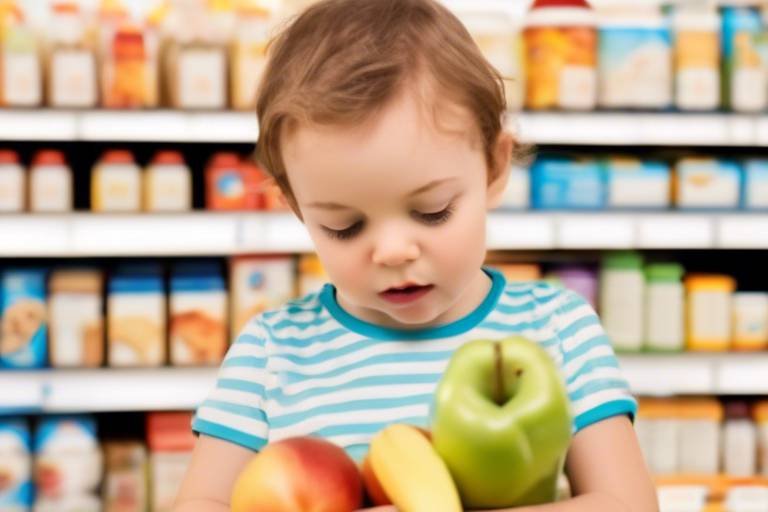The Role of Protein in Your Child's Growth
When it comes to your child's growth, protein plays a pivotal role that you simply can't overlook. Think of protein as the building blocks of your child's body, essential for constructing everything from muscles to organs. Just like a sturdy house needs a solid foundation, your child needs protein to grow strong and healthy. It's not just about growing taller; protein also supports vital functions like immune system health and hormone production. So, how do you ensure your little ones are getting enough of this nutrient? Let's dive into the significance of protein in childhood development and explore how you can make informed dietary choices.
Protein is essential for the growth and development of children, playing a crucial role in building and repairing tissues. It supports muscle development and contributes to overall physical health during critical growth periods. Imagine your child's body as a car engine; without the right fuel, it won't run efficiently. Similarly, inadequate protein can lead to stunted growth and developmental delays. By ensuring your child consumes enough protein, you're not just filling their tummy; you're fueling their potential!
There are various sources of protein suitable for children, including animal-based and plant-based options. Understanding these sources can help parents ensure their children receive adequate protein in their diets. Whether your family prefers meat and dairy or leans towards a plant-based lifestyle, there are plenty of delicious and nutritious ways to meet your child's protein needs.
Animal-based proteins, such as meat, fish, eggs, and dairy, provide complete proteins containing all essential amino acids necessary for growth and development in children. These sources are not only rich in protein but also packed with other vital nutrients. For instance, lean meats are a fantastic source of iron, which is crucial for cognitive development, while fish often contains omega-3 fatty acids that support brain health.
Dairy products are rich in protein and calcium, supporting bone health and growth. Incorporating milk, yogurt, and cheese into children's diets can enhance their nutritional intake effectively. You might think of dairy as the superhero of childhood nutrition, providing not just protein but also essential vitamins and minerals that help your child grow strong. For example, a simple glass of milk can deliver about 8 grams of protein along with a hefty dose of calcium, helping to build those strong bones!
Lean meats and fish are excellent protein sources, providing essential nutrients like iron and omega-3 fatty acids, which are vital for cognitive development and overall health in children. If your child enjoys a tasty grilled chicken breast or a fillet of salmon, you're not just treating them; you're also giving them a nutritional boost that can enhance their growth and learning capabilities. Think of these foods as brain fuel that can help your child excel in school and sports.
Plant-based proteins, including legumes, nuts, and whole grains, offer valuable nutrients and can be a great alternative for vegetarian or vegan families. They can effectively meet protein needs when combined appropriately. For instance, pairing rice with beans or peanut butter with whole-grain bread can create a complete protein source. So, if you're looking to diversify your child's diet, don't shy away from these plant-based options!
Understanding the recommended daily protein intake for children is crucial for their growth. Guidelines vary by age, ensuring children receive adequate nutrition tailored to their developmental needs. For example, toddlers may need around 13 grams of protein per day, while teenagers might require as much as 52 grams. Knowing these numbers can empower you to make better food choices for your child.
Protein requirements differ by age group, with younger children needing less than adolescents. Knowing these needs helps parents plan balanced meals that support their child's growth effectively. Here's a quick breakdown:
| Age Group | Recommended Daily Protein Intake (grams) |
|---|---|
| 1-3 years | 13 grams |
| 4-8 years | 19 grams |
| 9-13 years | 34 grams |
| 14-18 years | 46-52 grams |
Recognizing signs of protein deficiency is vital for parents. Symptoms can include fatigue, stunted growth, and weakened immunity, highlighting the importance of maintaining adequate protein levels in children’s diets. If you notice your child seems more tired than usual or is frequently falling ill, it might be time to evaluate their protein intake. Remember, a little attention to their diet can go a long way in ensuring they grow up healthy and strong!
- How can I increase my child's protein intake? Incorporate protein-rich foods like eggs, chicken, beans, and nuts into their meals and snacks.
- Is too much protein harmful for children? While protein is essential, excessive intake can strain the kidneys. It's best to follow recommended guidelines.
- Can my child get enough protein on a vegetarian diet? Absolutely! By combining different plant-based foods, vegetarian children can meet their protein needs.

Importance of Protein for Growth
Protein is often referred to as the building block of life, and when it comes to children's growth, this statement couldn't be more accurate. During the early years of life, children experience rapid growth and development, making protein an essential nutrient that supports this critical phase. Think of protein as the construction crew for your child's body, tirelessly working to build muscles, repair tissues, and produce vital hormones and enzymes. Without sufficient protein, this construction process can slow down, leading to various developmental issues.
Why is protein so important, you ask? Well, it serves several key functions in your child's body:
- Tissue Repair: Children are active and often prone to scrapes and bruises. Protein plays a crucial role in repairing damaged tissues, helping your little ones bounce back quickly.
- Muscle Development: As your child grows, they need strong muscles to support their activities, whether it's running, jumping, or playing sports. Protein is vital for building and maintaining muscle mass.
- Immune Function: A well-functioning immune system is essential for keeping your child healthy. Protein aids in the production of antibodies and immune cells, which help fight off infections.
Moreover, protein is involved in the production of hormones that regulate various bodily functions, including growth. For instance, growth hormone, which is crucial for physical development, relies on protein for its synthesis. This means that without adequate protein intake, your child may not reach their full growth potential.
It's also important to note that the body cannot store protein like it does carbohydrates and fats. This means that your child needs a regular supply of protein through their diet to support ongoing growth and development. So, how much protein do they need? The recommended daily intake varies based on age and activity level, but ensuring a steady intake is crucial.
In conclusion, protein is not just another nutrient; it is a fundamental element that fuels your child's growth journey. By understanding the importance of protein and incorporating a variety of protein-rich foods into their diet, you can help your child thrive and reach their developmental milestones with vigor and vitality.

Sources of Protein
When it comes to fueling your child's growth, understanding the is vital. Protein can be found in a variety of foods, and they can be broadly categorized into two main types: animal-based and plant-based sources. Each type offers unique benefits and can play a significant role in ensuring your child receives the necessary nutrients for their development. So, let’s dive into these sources and explore how they can contribute to a balanced diet.
Animal-based proteins are often considered complete proteins because they contain all the essential amino acids that the body cannot produce on its own. These sources include:
- Meat: Chicken, beef, and pork are rich in protein and also provide essential vitamins and minerals.
- Fish: Fish like salmon and tuna are not only high in protein but also packed with omega-3 fatty acids, which are crucial for brain development.
- Eggs: Eggs are another powerhouse of protein, and they are incredibly versatile, making them easy to incorporate into various meals.
- Dairy: Milk, yogurt, and cheese are excellent sources of protein and also provide calcium, which is essential for strong bones.
Including a variety of these animal-based proteins in your child's diet can help ensure they are getting a well-rounded intake of nutrients necessary for their growth.
Dairy products are particularly noteworthy when discussing protein sources. They are not only rich in protein but also loaded with calcium, which supports bone health. For children, consuming dairy can help in building a strong skeletal structure during their formative years. Incorporating items like milk, yogurt, and cheese into their meals can enhance their nutritional intake effectively. For instance, a bowl of yogurt topped with fruits can be a delicious and healthy snack that your child will love!
Lean meats and fish are exceptional protein sources that also supply essential nutrients like iron and omega-3 fatty acids. Iron is vital for transporting oxygen in the blood and is particularly important during periods of rapid growth. Omega-3 fatty acids are known for supporting cognitive development and overall health. A simple grilled chicken breast or a serving of baked salmon can go a long way in meeting your child's protein needs while also providing them with other necessary nutrients.
For families that prefer vegetarian or vegan diets, plant-based proteins offer a fantastic alternative. Foods such as legumes, nuts, seeds, and whole grains can provide substantial amounts of protein. While these sources are often considered incomplete proteins (lacking one or more essential amino acids), combining them can create a complete protein profile. For example, pairing rice with beans or peanut butter on whole-grain bread can ensure your child receives all the essential amino acids they need.
In addition to protein, plant-based sources are rich in fiber, vitamins, and minerals, making them a healthy choice for growing children. So, whether your child is a meat lover or a plant-based enthusiast, there are plenty of options to ensure they get the protein they need!

Animal-Based Protein Sources
When it comes to ensuring that your child gets enough protein, are often the most effective choices. These proteins are considered complete proteins because they contain all the essential amino acids that the body cannot produce on its own. This is crucial for children, who are in a constant state of growth and development. Think of protein as the building blocks of your child's body—without it, their growth can be stunted, much like trying to build a house without bricks!
Some of the most common animal-based protein sources include:
- Meat: Options like chicken, turkey, and lean beef are packed with protein and other vital nutrients.
- Fish: Not only is fish a great source of protein, but it also provides essential omega-3 fatty acids that are important for brain development.
- Eggs: Eggs are incredibly versatile and nutrient-dense, making them an excellent choice for breakfast, lunch, or dinner.
- Dairy: Milk, yogurt, and cheese are not only rich in protein but also in calcium, which is essential for developing strong bones.
Each of these sources contributes uniquely to your child's health. For example, lean meats are not just protein powerhouses; they also offer iron, which is critical for energy levels and cognitive function. Fish, on the other hand, is known for its omega-3 fatty acids, which can enhance brain health and improve focus—ideal for those long school days!
Moreover, incorporating a variety of these protein sources can help keep your child's meals exciting and balanced. For instance, you might consider serving grilled chicken with a side of steamed broccoli and a sprinkle of cheese, or a delicious omelet packed with veggies and cheese for breakfast. These meals not only provide protein but also a range of other nutrients that support overall health.
In summary, animal-based proteins are essential for your child's growth and development. By including a mix of meats, fish, eggs, and dairy in their diet, you can ensure that they receive the necessary nutrients to thrive. Remember, a well-balanced diet is key to a healthy and happy childhood!
1. How much protein does my child need daily?
The amount of protein needed varies by age. Generally, younger children need about 13-19 grams of protein per day, while adolescents may require 46-52 grams. It's essential to consider their overall diet and activity level.
2. Are there any risks associated with too much protein?
While protein is essential, excessive intake can lead to kidney strain and other health issues. It's best to aim for a balanced diet rather than focusing solely on protein.
3. Can my child get enough protein from a vegetarian diet?
Absolutely! With careful planning, vegetarian diets can provide all the necessary protein through sources like legumes, nuts, seeds, and dairy products.
4. What are some easy ways to include more protein in my child's meals?
Consider adding Greek yogurt to smoothies, incorporating eggs into breakfast, or using lean meats in stir-fries and salads. Small changes can make a big difference!

Benefits of Dairy Products
Dairy products are often touted as a powerhouse of nutrition, and for good reason! They are not only rich in protein, but also loaded with essential nutrients that are crucial for your child's growth and development. When you think of dairy, what comes to mind? Milk, cheese, and yogurt, right? Well, these delicious foods are more than just tasty treats; they play a significant role in building strong bones and muscles in children.
One of the standout benefits of dairy is its high content of calcium. Calcium is vital for developing strong bones and teeth, which is especially important during the growth spurts that occur in childhood and adolescence. Did you know that about 90% of a child's bone mass is built by the age of 18? This means that ensuring they get enough calcium from dairy can set the foundation for their skeletal health for years to come.
Moreover, dairy products also provide a good amount of vitamin D, which works hand-in-hand with calcium to promote bone health. Vitamin D helps the body absorb calcium more effectively, making it a crucial component of any child's diet. This is particularly important in regions with limited sunlight, as children might not get enough vitamin D naturally.
Let’s not forget about the protein aspect! Dairy products are an excellent source of high-quality protein, which is essential for muscle development and overall growth. Just a cup of milk contains about 8 grams of protein. This protein is made up of all the essential amino acids that a growing child needs to thrive. When kids are active, whether they're playing sports or just running around at the park, their bodies require adequate protein to repair and build muscle tissues.
In addition to these benefits, dairy products can also be quite versatile in the kitchen. They can be enjoyed in various forms, such as:
- Milk: A classic beverage that can be consumed plain, flavored, or added to smoothies.
- Yogurt: A delicious snack that can be topped with fruits or granola for added nutrition.
- Cheese: Perfect for sandwiches, salads, or just as a snack on its own.
By incorporating dairy into your child's diet, you not only provide them with essential nutrients but also introduce them to a variety of flavors and textures. It's a win-win situation! Remember, however, that some children may be lactose intolerant or have allergies to dairy. In such cases, there are plenty of lactose-free options and fortified plant-based alternatives available that can still meet their nutritional needs.
In summary, dairy products are a vital component of a balanced diet for children. They offer a wealth of benefits, from supporting bone health with calcium and vitamin D to providing essential protein for growth and development. So, next time you're planning meals for your little ones, consider how dairy can enhance their nutrition and overall health!
1. How much dairy should my child consume daily?
The recommended daily intake varies by age, but generally, children aged 2-3 years should have about 2 cups of dairy, while older children and teenagers may need 3 cups or more.
2. What if my child is lactose intolerant?
If your child is lactose intolerant, you can opt for lactose-free dairy products, which provide the same nutrients without the discomfort. Alternatively, fortified plant-based milk can be a good substitute.
3. Are there non-dairy sources of calcium?
Yes! Non-dairy sources of calcium include leafy greens, almonds, tofu, and fortified foods like orange juice and cereals.
4. Can too much dairy be harmful?
While dairy is beneficial, moderation is key. Overconsumption can lead to excess calories and potential weight gain. Always balance dairy intake with other food groups.

Meat and Fish Options
When it comes to ensuring your child receives adequate protein, meat and fish are among the top contenders. These foods not only provide high-quality protein but also come packed with essential nutrients that are crucial for your child's growth and development. For instance, lean meats like chicken and turkey are excellent sources of protein, which help in building and repairing tissues. What's more, they are low in fat, making them a healthy option for your little ones.
Fish, on the other hand, is often celebrated for its rich content of omega-3 fatty acids, which are vital for cognitive development. Including fish such as salmon, mackerel, and sardines in your child's diet can significantly boost their brain health. Not to mention, these fish are also loaded with vitamins and minerals that support overall health. It’s a win-win situation!
To help you understand the benefits better, here’s a quick comparison of some popular meat and fish options:
| Food Item | Protein Content (per 100g) | Key Nutrients |
|---|---|---|
| Chicken Breast | 31g | Vitamin B6, Niacin |
| Salmon | 25g | Omega-3 Fatty Acids, Vitamin D |
| Lean Beef | 26g | Iron, Zinc |
| Tuna | 30g | Omega-3 Fatty Acids, Selenium |
Incorporating a variety of these protein sources into your child's diet can help them meet their nutritional needs effectively. However, it's essential to consider the preparation methods as well. Grilling, baking, or steaming are healthier options compared to frying, which can add unnecessary fats. Remember, balance is key!
As a parent, you might wonder how to make these protein-rich foods more appealing to your child. One great trick is to get creative with recipes. For example, you can prepare taco night with lean ground beef or chicken, allowing your child to customize their meal with toppings like lettuce, cheese, and salsa. Or you could whip up a delicious fish taco using grilled salmon, which is not only tasty but also packed with nutrients.
In conclusion, meat and fish are not just protein powerhouses; they also contribute significantly to your child's overall health and well-being. By incorporating these foods into their meals, you're setting them up for a future filled with growth and vitality.
- How much protein does my child need daily? The protein requirement varies by age, with younger children needing around 13-19 grams, while adolescents may require 34-52 grams.
- Can my child get enough protein from a vegetarian diet? Yes! With proper planning, vegetarian sources like legumes, nuts, and whole grains can meet protein needs.
- What are the best ways to prepare meat and fish for children? Healthy cooking methods like grilling, baking, and steaming are recommended to keep meals nutritious.

Plant-Based Protein Sources
When it comes to ensuring your child gets enough protein, plant-based sources can be a fantastic option, especially for families who prefer vegetarian or vegan diets. These sources not only provide the necessary protein but also come packed with a variety of other nutrients that contribute to overall health. Think of plant-based proteins as the hidden gems of nutrition; they offer a wealth of benefits that can support your child's growth and development.
Some of the best plant-based protein sources include legumes, nuts, and whole grains. Let’s dive into each of these categories:
- Legumes: Beans, lentils, and chickpeas are protein powerhouses. For instance, a cup of cooked lentils can provide around 18 grams of protein! They're not just great for protein; they also offer fiber, iron, and other essential vitamins.
- Nuts and Seeds: Almonds, walnuts, chia seeds, and flaxseeds are loaded with protein and healthy fats. Just a handful of nuts can give your child a significant protein boost while also supporting brain health.
- Whole Grains: Quinoa, brown rice, and oats also contribute to protein intake. Quinoa is particularly special because it is a complete protein, meaning it contains all nine essential amino acids that the body cannot produce on its own.
Combining different plant-based proteins can help ensure that your child receives all the essential amino acids needed for optimal growth. For example, pairing rice and beans not only creates a delicious meal but also provides a complete protein profile. It's like a culinary partnership that maximizes nutritional benefits!
One of the best things about plant-based proteins is their versatility. You can incorporate them into various meals, from smoothies and salads to soups and stir-fries. Think of it as a creative adventure in the kitchen! For instance, you can blend some spinach, banana, and almond butter for a protein-packed smoothie that your kids will love. Or, whip up a hearty lentil soup that warms the soul while nourishing the body.
In addition to being nutritious, plant-based proteins are often easier on the wallet compared to animal proteins, making them an economical choice for families. Plus, they come with the added benefit of being environmentally friendly, contributing to a sustainable lifestyle.
Remember, while focusing on plant-based proteins, it’s crucial to ensure that your child is getting a variety of foods to meet their overall nutritional needs. This way, you can help them grow strong and healthy while also introducing them to the exciting world of plant-based eating!
Q: Can my child get enough protein from a vegetarian or vegan diet?
A: Absolutely! With careful planning, children can meet their protein needs through a variety of plant-based sources. Just ensure they consume a mix of legumes, nuts, seeds, and whole grains.
Q: How can I ensure my child is getting complete proteins from plant sources?
A: Pairing different plant proteins, such as rice and beans or peanut butter on whole-grain bread, can provide all the essential amino acids needed for growth.
Q: Are there any signs that my child might not be getting enough protein?
A: Yes, symptoms can include fatigue, stunted growth, and weakened immunity. If you notice these signs, it might be time to reassess their diet.

Recommended Daily Protein Intake
Understanding the for children is crucial for their growth and development. Protein is not just a building block; it's a fundamental nutrient that fuels the body, supports immune function, and helps in the overall development of vital organs. But how much protein do our little ones really need? The answer isn't one-size-fits-all. It varies based on age, sex, and level of physical activity.
To help you grasp this better, here’s a breakdown of the recommended protein intake for various age groups:
| Age Group | Recommended Daily Protein Intake (grams) |
|---|---|
| 1-3 years | 13 grams |
| 4-8 years | 19 grams |
| 9-13 years | 34 grams |
| 14-18 years | 46 grams (girls), 52 grams (boys) |
This table highlights the specific protein needs for different ages. For instance, toddlers aged 1 to 3 only require about 13 grams of protein daily, which can easily be met through a balanced diet that includes dairy, eggs, and legumes. As children grow into their pre-teen years, their protein needs increase significantly, reaching up to 34 grams for those aged 9 to 13. This increase is essential as their bodies undergo rapid changes and they become more active.
It's also important to note that these recommendations can vary based on individual circumstances. For example, if your child is an athlete or engages in regular physical activity, they may require additional protein to support muscle recovery and growth. Therefore, it’s always a good idea to consult with a pediatrician or a nutritionist to tailor these recommendations to your child's specific needs.
In addition to knowing how much protein your child needs, being aware of the signs of protein deficiency is equally important. Symptoms such as fatigue, stunted growth, and weakened immunity can indicate that your child is not getting enough protein. If you notice any of these signs, it might be time to reassess their diet and make some changes.
In conclusion, ensuring your child receives the right amount of protein is a vital part of supporting their growth and development. By being informed about their protein needs and incorporating a variety of protein sources into their meals, you can help set the foundation for a healthy, active life.
- What are some good sources of protein for children?
Good sources include lean meats, fish, eggs, dairy products, legumes, nuts, and seeds. Each of these can provide essential amino acids needed for growth.
- Can children get enough protein from a vegetarian diet?
Yes, children can get sufficient protein from a vegetarian diet by combining various plant-based sources like beans, lentils, tofu, and whole grains.
- How can I tell if my child is getting enough protein?
Look for signs of healthy growth, energy levels, and overall well-being. If you notice fatigue or stunted growth, consult a healthcare professional.

Protein Needs by Age Group
Understanding the protein needs of children at different stages of their growth is crucial for parents who want to ensure their little ones are thriving. Just like a car needs the right fuel to run smoothly, children need the right amount of protein to support their development. The amount of protein required varies significantly by age, reflecting the unique growth spurts and developmental milestones each child experiences.
For instance, infants have different protein requirements compared to toddlers or adolescents. According to nutritional guidelines, the recommended daily intake of protein can be broken down by age group. Here’s a simple table that illustrates the general protein needs:
| Age Group | Recommended Daily Protein Intake (grams) |
|---|---|
| Infants (0-6 months) | 9-11 grams |
| Toddlers (1-3 years) | 13 grams |
| Children (4-8 years) | 19 grams |
| Preteens (9-13 years) | 34 grams |
| Teenagers (14-18 years) | 46-52 grams |
As you can see, the protein requirements increase as children grow older. Infants primarily get their protein from breast milk or formula, which is specially designed to meet their nutritional needs. Once they transition to solid foods, parents should focus on including a variety of protein sources to meet the recommended intake.
For toddlers and young children, protein-rich foods like eggs, dairy, and lean meats can be introduced gradually. It's important to remember that while protein is essential, balance is key. A well-rounded diet that includes fruits, vegetables, and whole grains is just as crucial for overall health.
As children enter their preteen and teenage years, their protein needs increase significantly. This is the time when they experience rapid growth and development, especially during puberty. Active teenagers, especially those involved in sports, may require even higher protein intake to support muscle development and recovery. Parents should encourage their teens to consume protein-rich snacks like Greek yogurt, nut butter, or protein shakes after workouts.
In summary, understanding and meeting your child's protein needs is essential for their growth and health. By providing a variety of protein sources tailored to their age group, you can help ensure they have the building blocks they need to grow strong and healthy.
- What are the best sources of protein for children?
Both animal-based sources like meat, fish, eggs, and dairy, as well as plant-based sources like legumes, nuts, and whole grains are excellent. A balanced diet incorporating both types is ideal.
- Can children get enough protein from a vegetarian diet?
Yes! With careful planning, vegetarian diets can provide all the necessary protein through combinations of legumes, nuts, seeds, and whole grains.
- What are the signs of protein deficiency in children?
Symptoms may include fatigue, stunted growth, weakened immunity, and frequent infections. If you suspect a deficiency, consult a healthcare provider.

Signs of Protein Deficiency
This article explores the significance of protein in childhood development, its sources, and how it contributes to overall health and growth. Understanding protein's role can help parents make informed dietary choices for their children.
Protein is essential for the growth and development of children, playing a crucial role in building and repairing tissues. It supports muscle development and contributes to overall physical health during critical growth periods.
There are various sources of protein suitable for children, including animal-based and plant-based options. Understanding these sources can help parents ensure their children receive adequate protein in their diets.
Animal-based proteins, such as meat, fish, eggs, and dairy, provide complete proteins containing all essential amino acids necessary for growth and development in children.
Dairy products are rich in protein and calcium, supporting bone health and growth. Incorporating milk, yogurt, and cheese into children's diets can enhance their nutritional intake effectively.
Lean meats and fish are excellent protein sources, providing essential nutrients like iron and omega-3 fatty acids, which are vital for cognitive development and overall health in children.
Plant-based proteins, including legumes, nuts, and whole grains, offer valuable nutrients and can be a great alternative for vegetarian or vegan families. They can effectively meet protein needs when combined appropriately.
Understanding the recommended daily protein intake for children is crucial for their growth. Guidelines vary by age, ensuring children receive adequate nutrition tailored to their developmental needs.
Protein requirements differ by age group, with younger children needing less than adolescents. Knowing these needs helps parents plan balanced meals that support their child's growth effectively.
Recognizing the signs of protein deficiency is vital for parents who want to ensure their children are thriving. Symptoms can be subtle but may lead to serious health issues if not addressed. Some common signs to watch for include:
- Fatigue: Children lacking adequate protein may feel tired and sluggish, which can affect their ability to participate in daily activities.
- Stunted Growth: Insufficient protein can hinder a child's growth, leading to shorter stature compared to peers.
- Weakened Immunity: A diet low in protein can compromise the immune system, making children more susceptible to infections.
- Swelling: Edema or swelling, particularly in the abdomen and legs, can indicate a lack of protein in the diet.
It’s crucial for parents to be observant and proactive. If you notice any of these signs, it may be time to reassess your child's diet. Consulting with a healthcare provider or nutritionist can provide tailored advice to ensure your child is getting the right amount of protein for their needs.
Q: How much protein does my child need daily?
A: The protein needs vary by age. Generally, children aged 1-3 need about 13 grams per day, while those aged 4-8 require around 19 grams. Adolescents may need between 34 to 52 grams, depending on their age and activity level.
Q: Can my child get enough protein from a vegetarian diet?
A: Absolutely! With a variety of plant-based protein sources like legumes, nuts, and whole grains, vegetarian children can meet their protein needs effectively.
Q: What are some good protein snacks for kids?
A: Great protein-rich snacks include yogurt, cheese sticks, nut butter on whole-grain bread, hummus with veggies, or hard-boiled eggs.
Frequently Asked Questions
- Why is protein important for my child's growth?
Protein is vital for your child's growth as it helps build and repair tissues. It plays a major role in muscle development and supports overall physical health during those crucial growth periods. Think of protein as the building blocks that help your child grow strong and healthy!
- What are some good sources of protein for children?
There are plenty of protein sources you can include in your child's diet! Animal-based options like meat, fish, eggs, and dairy provide complete proteins, while plant-based sources like legumes, nuts, and whole grains are also excellent. Mixing and matching these options can ensure your child gets all the protein they need.
- How much protein does my child need daily?
The recommended daily protein intake varies by age. Younger children need less protein than adolescents. It's important to tailor their meals according to these needs to support their growth effectively. You can check with a nutritionist or pediatrician for specific guidelines!
- What are the signs of protein deficiency in children?
Recognizing protein deficiency is crucial for your child's health. Symptoms may include fatigue, stunted growth, and a weakened immune system. If you notice any of these signs, it might be time to reassess their protein intake and consult a healthcare professional.
- Can vegetarian or vegan diets provide enough protein for children?
Absolutely! Vegetarian and vegan diets can provide sufficient protein when planned correctly. Combining different plant-based protein sources, like legumes with whole grains, can help meet your child's protein needs while ensuring they get a variety of nutrients.
- Are dairy products beneficial for my child's growth?
Yes! Dairy products are rich in protein and calcium, both of which are essential for bone health and growth. Incorporating items like milk, yogurt, and cheese into your child's diet can significantly enhance their nutritional intake.
- How can I ensure my child is getting enough protein?
To ensure your child gets enough protein, include a variety of protein sources in their meals. Make mealtime fun by letting them help choose and prepare protein-rich foods. Regularly check their growth and energy levels, and consult a healthcare professional if you have concerns.



















